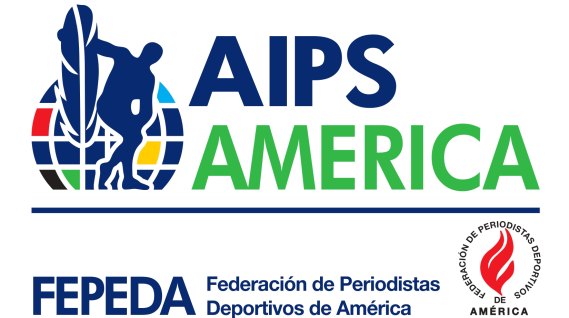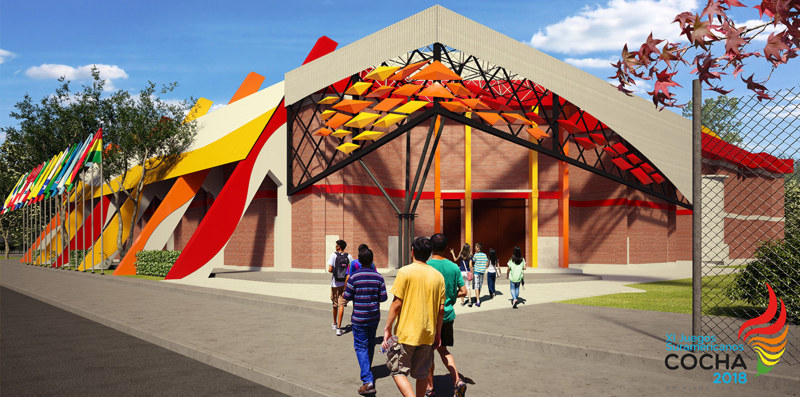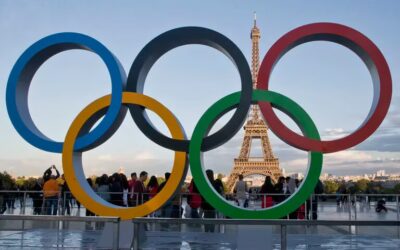Por Constanza Mora Pedraza – Miembro AIPS
BOGOTÁ, Colombia, 27 de marzo de 2018.- Con la participación de 14 países se llevará a cabo, en la ciudad boliviana de Cochabamba, la edición número 11 de los Juegos Suramericanos, el evento deportivo más importante de la parte sur del continente americano y en el que además participarán países del Caribe. Los juegos se realizarán del 26 de mayo al 8 de junio de 2018, en ésta ciudad, la cual ha sido semillero del deporte de ese país.
La iniciativa de la realización de los Juegos Suramericanos nació en Argentina en 1974, con dos ideas principales, la de unir el deporte y la de promoverlo y difundirlo en el sur del continente. En su primera y segunda edición se denominaron ‘Juegos Cruz del Sur’ y en años posteriores ha cambiado entre ‘Juegos Suramericanos’ y ‘Juegos Sudamericanos’ por diferencias lingüísticas entre los países que han sido sede.
- Mascota 2: Juki: El oso jukumari. / Mascot 2: Juki: The jukumari bear.
- Mascota 1: Nuna: La jaguar jukumari. / Mascot 1: Nuna: The jakumari jaguar.
LA SALUD ALIMENTICIA SERÁ UNA DE LAS PRIORIDADES
Miles serán los visitantes que lleguen a Cochabamba para estos juegos, es por eso, que el Comité Organizador trabaja de la mano con el Servicio Nacional de Sanidad Agropecuaria e Inocuidad Alimentaria, con el Servicio Departamental de Salud y con las intendencias de los 14 municipios donde se realizarán las competencias, para capacitar a los vendedores de alimentos, con relación a la manipulación, conservación e higiene de sus productos.
Durante este mes de marzo, ODESUR con Mario Cilenti, Director Ejecutivo y Fabio Ramírez, Gerente Técnico, estará supervisando los avances del Comité Organizador y para abril se espera la visita de la ex atleta colombiana Ximena Restrepo, representante también de ODESUR.
PAÍSES PARTICIPANTES
Argentina
Fue sede de los juegos realizados en 1982 (Rosario) y 2006 (Buenos Aires) y es el país que más veces ha terminado primero en la tabla general, logró los títulos de 1978, 1982, 1986, 1990, 1994, 1998 y 2006.
Aruba
Participa en los Juegos Suramericanos desde 1994. Su mejor participación ha sido en 2002, cuando terminó en la posición número 12.
Bolivia
Fue sede de los primeros juegos en 1978, logrando su mejor participación ese mismo año, terminando en la tercera posición. Es uno de los países que ha estado presente en todas las ediciones.
Brasil
También ha participado en todas las ediciones y es el actual campeón, igualmente fue primero en 2002 cuando las justas se realizaron en su país. Con 148 oros, ostenta el record de más medallas ganadas en una misma edición, justamente en 2002.
Chile
Ha estado en todas las ediciones. Nunca ha salido campeón, pero terminó como segundo en 1978, 1982 y 1986. En los últimos juegos fue quinto. Ha sido sede en dos ocasiones, las dos en Santiago, en 1986 y 2014.
Colombia
Ha estado ausente en tres ediciones, 1978, 1990 y 2002. Desde 1994 ha estado siempre en el podio. Finalizó tercera en 1994 y 2006, segunda en 1998 y 2014 y fue campeona en 2010. Ha sido sede solo en una oportunidad, en 2010. Tiene el record de más medallas ganadas en una misma edición, con 347, logradas en Medellín 2010.
Ecuador
En las 10 ediciones realizadas ha participado y su mejor resultado se dio en 1978 y 1986 cuando ocupó la cuarta casilla del medallero general. Fue sede de los juegos realizados en 1998
Guyana
Hace parte de los Juegos Suramericanos desde 1998 y en 2010 logró su mejor ubicación terminando en la casilla número 10.
Panamá
Desde 1994 ha participado ininterrumpidamente. Su mejor presentación ha sido la octava casilla, lograda en 1994 y 2014.
Paraguay
Ha participado en las 10 ediciones, aunque nunca ha salido campeón y tampoco ha logrado conformar el podio. Será sede por primera vez en la siguiente edición a realizarse en el año 2022.
Perú
En 1990 fue sede de los juegos, realizados en Lima. Dos veces ha estado en el podio general. En 1990 fue segundo y en 1982 terminó tercero.
Surinam
Comenzó su participación en los Juegos Suramericanos en 1990 y desde entonces no ha dejado de asistir. Su mejor resultado general fue en 1998, finalizando en la octava posición.
Uruguay
Ha estado presente en todas las ediciones. Solamente en 1986 logró el tercer puesto en la clasificación general, siendo esta su mejor participación. Hasta el momento no ha sido sede de las justas.
Venezuela
Solamente ha faltado a una edición, la primera en 1978. Ha terminado en el podio 4 veces, en dos oportunidades fue segunda en 1994 y 2002 y también dos veces ha sido tercera, en 2010 y 2014.
Hace cuatro años, estuvieron los mismos 14 países y se disputaron 44 eventos deportivos.
En las 10 ediciones, los juegos han entregado 9.566 medallas en total.
| País | Oro | Plata | Bronce | Total | |
| 1 | Argentina | 845 | 698 | 660 | 2203 |
| 2 | Brasil | 646 | 544 | 49 | 1683 |
| 3 | Venezuela | 490 | 413 | 443 | 1345 |
| 4 | Colombia | 410 | 350 | 334 | 1094 |
| 5 | Chile | 316 | 421 | 476 | 1213 |
| 6 | Perú | 168 | 241 | 322 | 731 |
| 7 | Ecuador | 163 | 227 | 323 | 713 |
| 8 | Uruguay | 63 | 105 | 129 | 297 |
| 9 | Bolivia | 31 | 69 | 141 | 233 |
| 10 | Paraguay | 13 | 34 | 47 | 95 |
| 11 | Panamá | 11 | 14 | 24 | 49 |
| 12 | Antillas Neerlandesas | 7 | 7 | 17 | 31 |
| 13 | Surinam | 7 | 3 | 11 | 22 |
| 14 | Guyana | 2 | 3 | 9 | 14 |
| 15 | Aruba | 0 | 3 | 10 | 13 |
DEPORTES
Estos serán los deportes de la XI edición de los Juegos Suramericanos, Cochabamba 2018
| Aguas Abiertas | Atletismo | Bádminton |
| Baloncesto | Balonmano | Bowling |
| Boxeo | Canotaje | Ciclismo BMX |
| Ciclismo MTB | Ciclismo Pista | Ciclismo Ruta |
| Clavados | Ecuestre | Esgrima |
| Esquí Náutico | Fútbol | Fútbol Sala |
| Gimnasia Artística | Gimnasia Rítmica | Gimnasia Trampolín |
| Golf | Hockey Césped | Judo |
| Karate | Levantamiento de Pesas | Lucha |
| Natación | Nado Sincronizado | Patinaje Artístico |
| Patinaje Carreras | Pelota Vasca | Pentatlón Moderno |
| Polo Acuático | Ráquetbol | Remo |
| Rugby | Squash | Taekwondo |
| Tenis | Tenis de Mesa | Tiro con Arco |
| Tiro Deportivo | Triatlón | Vela |
| Voleibol | Voleibol Playa |
ESCENARIOS
36, son los escenarios en los que se realizarán estos juegos, entre los que se destacan el Centro de Alto Rendimiento Federico Román, el Coliseo Evo Morales, el Coliseo Polideportivo Universidad Mayor de San Simón, la Piscina Olímpica de Villa Tunari entre otros.
TODOS LOS ESCENARIOS
Cabaña del Arquitecto. Centro Acuático. Centro de Alto Rendimiento Federico Román. Circuito BMX G.A.M.C. Circuito Cerro San Pedro. Circuito Cochambamba. Club Olympic. Coliseo Evo Morales. Coliseo Grover Suárez. Coliseo José Casto Méndez. Coliseo José Villazón. Coliseo Municipal de Chimoré. Coliseo Municipal de Punata. Coliseo Municipal de Punata Jorge Wilstermann. Coliseo Municipal de Shinahota. Coliseo Polideportivo Universidad Mayor de San Simón, Complejo de Squash. Complejo Deportivo Aurora. Complejo Deportivo Sacaba. Complejo Municipal de Ráquetbol. Complejo Sarco. Country Club Cochabamba. Escuela Militar de Sargentos del Ejército. Estadio de Atletismo G.A.M.C. Estadio Félix Capriles. Estadio Municipal de Colcapirhua. Frontón Municipal G.A.M.C. Laguna de Corani. Laguna de Angostura. Pabellón Municipal de Gimnasia G.A.M.C. Patinódromo Municipal G.A.M.C. Piscina Olímpica de Villa Tunari. Polideportivo Olímpico Juan Evo Morales Ayma. Super Bowling. Tropico y Velódromo Villa Suramericana .
LAS MASCOTAS
Por primera vez en la historia de los Juegos se contará con dos mascotas. Un jaguar y un oso jukumari serán los encargados de recibir a los cientos de deportistas y aficionados en Cochabamba.
Juki: El oso jukumari es originario de los Andes, habita en varios países de Suramérica y aunque representa una especie con mucha fuerza, está en peligro de extinción. Juki, digno representante de Cochabamba es un animal con mucha gracia, ternura y belleza y en sus ojos lleva a Suramérica en forma de manchas abstractas, lo que significa que el mundo tendrá los ojos puestos en los Juegos Suramericanos Cochabamba 2018.
Nuna: La jaguar jukumari también vive en varios países de Sudamérica y su nombre significa espíritu o alma. Los aros olímpicos están en su cuerpo y patas traseras. También lleva en sus ojos a Suramérica en forma de manchas abstractas.
———-
ENGLISH:
Cochabamba 2018, the second event of the olympic cycle in America
By: Constanza Mora Pedraza – AIPS Member
BOGOTÁ, Colombia March 27, 2018.- With 14 countries in competition will be held, in the Bolivian city of Cochabamba, the 11th edition of the South American Games, the most important sporting event in the southern part of the American continent and in which invited countries of the Caribbean, will also participate. The games will take place from May 26 to June 8, 2018, in this city, which has been the birth city of many great athletes of that country.
The initiative to create the South American Games was born in Argentina in 1974, with two main ideas, to united and to promote and spread the sport in the south of the continent. In its first and second edition, they were called ‘Cruz del Sur Games’ and in later years they have changed between ‘Sur-American Games’ and ‘Sud-American Games’ due to linguistic differences between the countries that have hosted them.
‘HEALTH FOOD’ WILL BE ONE OF THE PRIORITIES
Thousands of people will visit Cochabamba for these games, reason why the Organizing Committee works hand in hand with the National Service of Agricultural Health and Food Safety, with the Health Service Department and with the 14 municipalities where competences will be carried out, to train food sellers in relation to the handling, conservation and hygiene of their products.
During March, ODESUR with Mario Cilenti, Executive Director and Fabio Ramírez, Technical Manager, will be monitoring the progress of the Organizing Committee and for April the visit of the former Colombian athlete Ximena Restrepo, also representative of ODESUR, is expected.
PARTICIPATING COUNTRIES
Argentina
Hosted the games in 1982 (Rosario) and 2006 (Buenos Aires) and is the country that has been champion more times, achieved the titles of 1978, 1982, 1986, 1990, 1994, 1998 and 2006.
Aruba
Has participated in the South American Games since 1994. The best participation was in 2002, when finished in the 12th.
Bolivia
Hosted the first games in 1978, achieving its best participation that year, finishing in 3rd place. It is one of the countries that has been present in all editions.
Brazil
Has also participated in all editions and is the current champion, was also first in 2002 when the games were in its country. With 148 gold, holds the record for more medals won in the same edition, just in 2002.
Chile
Has participated in all editions. Has never been champion, but finished as second in 1978, 1982 and 1986. In the last games was fifth. Has hosted the games twice, both in Santiago, in 1986 and 2014.
Colombia
Has been absent in three editions, 1978, 1990 and 2002. Since 1994 has always been in the podium. Finished third in 1994 and 2006, second in 1998 and 2014 and was champion in 2010. Was the venue in 2010. Has got the record of more medals won in the same edition, with 347 achieved in Medellín, 2010.
Ecuador
In the 10 editions has participated. Its best result was in 1978 and 1986 when occupied the fourth position. Was the venue of the 1998 games.
Guyana
Has been part of the South American Games since 1998 and in 2010 achieved its best result ending 10th.
Panama
Since 1994 has participated uninterruptedly. Its best achievement was the eighth position in 1994 and 2014.
Paraguay
Has participated in the 10 editions, although has never been a champion and has not make the podium either. Will be the venue for the first time in the next edition to be held in 2022.
Peru
In 1990 hosted the games, in Lima. Twice has been on the podium, in 1990 was second and in 1982 finished third.
Surinam
Began its participation in the South American Games in 1990 and since then has not stopped attending. Its best result was in 1998, when finished 8th.
Uruguay
Has been present in all editions. Only in 1986 achieved the 3rd place in the general classification, being this its best participation. So far has never host the games.
Venezuela
Has only missed one edition, the first in 1978. Has finished twice in the second place in 1994 y 2002 and also twice in the third place in 2010 and 2014.
Four years ago, the same 14 countries participated and 44 sporting events were held.
In the 10 editions, the games have been given 9,566 medals in total.
| Country | Gold | Silver | Bronze | Total | |
| 1 | Argentina | 845 | 698 | 660 | 2203 |
| 2 | Brazil | 646 | 544 | 49 | 1683 |
| 3 | Venezuela | 490 | 413 | 443 | 1345 |
| 4 | Colombia | 410 | 350 | 334 | 1094 |
| 5 | Chile | 316 | 421 | 476 | 1213 |
| 6 | Peru | 168 | 241 | 322 | 731 |
| 7 | Ecuador | 163 | 227 | 323 | 713 |
| 8 | Uruguay | 63 | 105 | 129 | 297 |
| 9 | Bolivia | 31 | 69 | 141 | 233 |
| 10 | Paraguay | 13 | 34 | 47 | 95 |
| 11 | Panama | 11 | 14 | 24 | 49 |
| 12 | Netherlands Antilles | 7 | 7 | 17 | 31 |
| 13 | Suriname | 7 | 3 | 11 | 22 |
| 14 | Guyana | 2 | 3 | 9 | 14 |
| 15 | Aruba | 0 | 3 | 10 | 13 |
SPORTS
These will be the sports of the 11th edition of the South American Games, Cochabamba 2018
| Open Water | Athletics | Badminton |
| Basketball | Handball | Bowling |
| Boxing | Canoeing | BMX Cycling |
| Cycling MTB | Cycling Track | Cycling Route |
| Diving | Equestrian | Fencing |
| Ski | Soccer | Futsal |
| Artistic Gymnastics | Rhythmic Gymnastics | Trampoline Gymnastics |
| Golf | Hockey | Judo |
| Karate | Weightlifting | Lucha |
| Swimming | Swimming Synchronized | Figure Skating |
| Skating Roller | Vasca Ball | Modern Pentathlon |
| Water Polo | Raquetball | Rowing |
| Rugby | Squash | Taekwondo |
| Tennis | Table Tennis | Archery |
| Shooting | Triathlon | Sail |
| Volleyball | Beach Volleyball |
VENUES
36 are the venues in which these games will take place, the High Performance Center Federico Román, the Evo Morales Coliseum, the Coliseo Polideportivo Universidad Mayor de San Simón, the Olympic Pool of Villa Tunari, among others.
ALL VENUES
Architect’s Cabin Aquatic center. Federico Roman High Performance Center. Circuit BMX G.A.M.C. Cerro San Pedro circuit. Cochambamba circuit. Olympic Club. Evo Morales Coliseum. Coliseo Grover Suárez. José Casto Méndez Coliseum. José Villazón Coliseum. Municipal Coliseum of Chimoré. Municipal Coliseum of Punata. Municipal Coliseum of Punata Jorge Wilstermann. Municipal Coliseum of Shinahota. Coliseum Polideportivo Universidad Mayor de San Simón, Squash Complex. Aurora Sports Complex. Sports Complex Sacaba. Municipal Complex of Raquetbol. Sarco Complex. Country Club Cochabamba. Military School of Army Sergeants. Athletics Stadium G.A.M.C. Félix Capriles Stadium. Municipal Stadium of Colcapirhua. Municipal Fronton G.A.M.C. Laguna de Corani. Laguna de Angostura. Municipal Gymnastics Pavilion G.A.M.C. Municipal Patinódromo G.A.M.C. Olympic Pool of Villa Tunari. Olympic Sports Center Juan Evo Morales Ayma. Super Bowling Tropico and Velodrome Villa Suramericana.
MASCOTS
For the first time in the history of the Games, there will be two mascots. A jaguar and a bear will be in charge of welcoming the hundreds of athletes and fans in Cochabamba.
Juki: The jukumari bear is a native animal of the Andes, lives in several countries of South America and although it represents a species with great force, it is in danger of extinction. Juki, worthy representative of Cochabamba is an animal with a lot of grace, tenderness and beauty, and in his eyes the South America map shows in form of abstract spots, which means that the world will have its eyes set on the South American Games Cochabamba 2018.
Nuna: The jakumari jaguar also lives in several countries of South America and its name means spirit or soul. The Olympic rings are on his body and back legs. He also carries in his eyes the South America map in the form of abstract spots.






